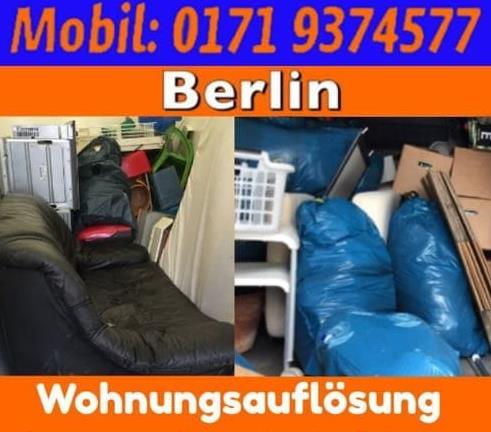The Ultimate Guide to Apartment Liquidation in Berlin
Moving can be a daunting task, especially when it involves liquidating an apartment in a city as vibrant and diverse as Berlin. Whether you’re relocating, downsizing, or simply looking for a fresh start, apartment liquidation requires careful planning and execution. This comprehensive guide will walk you through the essential steps to effectively navigate the process of Apartmentliquidation Berlin.
Table of Contents
- Understanding Apartment Liquidation
- What is Apartment Liquidation?
- Reasons for Apartment Liquidation
- Preparation Phase
- Set Clear Goals
- Inventory Assessment
- Determine Valuables
- Research Market Trends
- Decluttering and Sorting
- Categorize Items
- Prioritize Essentials
- Selling, Donating, and Discarding
- Selling Possessions
- Online Platforms
- Secondhand Stores and Flea Markets
- Estate Sales and Auctions
- Donating and Disposing
- Charitable Organizations
- Recycling and Waste Management
- Legal and Administrative Matters
- Rental Agreement Terms
- Informing Authorities
- Contract Terminations
- Property Maintenance and Repairs
- Minor Repairs
- Cleaning Services
- Moving Logistics
- Hiring Professional Movers
- Packing and Labeling
- Finalizing the Process
- Inspection and Handover
- Security Deposit and Refund
- Documenting the Process
1. Understanding Apartment Liquidation
What is Apartment Liquidation?
Apartment liquidation involves the process of clearing, selling, donating, and disposing of belongings in an apartment before vacating it. This is done to ensure a smooth transition for both the tenant and the landlord.
Reasons for Apartment Liquidation
Common reasons for apartment liquidation include relocation to a new city, downsizing to a smaller space, moving in with a partner, or even inheriting property. Whatever the reason, proper planning can alleviate stress and ensure a successful liquidation process.
2. Preparation Phase
Set Clear Goals
Determine whether you want to sell, donate, or discard items. This will help you streamline the process and avoid confusion later on.
Inventory Assessment
Make a detailed inventory of all items in the apartment. Group them by categories such as furniture, electronics, clothing, kitchenware, etc.
Determine Valuables
Identify valuable items that might fetch a good price. This could include vintage furniture, collectibles, or high-end electronics.
Research Market Trends
Understand the secondhand market in Berlin. Research the current demand for certain items and their resale value.
3. Decluttering and Sorting
Categorize Items
Sort your belongings into categories like “keep,” “sell,” “donate,” and “discard.” This will help you stay organized.
Prioritize Essentials
Keep items that hold sentimental value or are essential for your new living situation.
Selling, Donating, and Discarding
Utilize online platforms, secondhand stores, flea markets, or even organize an estate sale to sell items. Donate usable items to charitable organizations and responsibly dispose of items that cannot be reused.
4. Selling Possessions
Online Platforms
Websites like eBay Kleinanzeigen, Facebook Marketplace, and Shpock are popular platforms to sell items.
Secondhand Stores and Flea Markets
Local secondhand stores and flea markets can be great options to sell furniture, clothing, and other items.
Estate Sales and Auctions
For valuable collectibles or antiques, consider estate sales or auctions.
5. Donating and Disposing
Charitable Organizations
Donate items to local charities or non-profit organizations. This not only benefits others but also reduces waste.
Recycling and Waste Management
Dispose of non-recyclable and non-donatable items responsibly through proper waste management channels.
6. Legal and Administrative Matters
Rental Agreement Terms
Review your rental agreement to understand the terms and conditions related to moving out and apartment condition.
Informing Authorities
Notify relevant authorities, such as your landlord, about your intention to move and the timeline.
Contract Terminations
Cancel utilities, internet, and other services associated with the apartment.
7. Property Maintenance and Repairs
Minor Repairs
Fix minor damages like nail holes, paint touch-ups, and broken fixtures to ensure the apartment is in good condition.
Cleaning Services
Consider hiring professional cleaning services to leave the apartment spotless.
8. Moving Logistics
Hiring Professional Movers
Engage a reliable moving company to assist with transporting your belongings to the new location.
Packing and Labeling
Properly pack and label boxes to ensure easy unpacking and organization in your new space.
9. Finalizing the Process
Inspection and Handover
Coordinate a final inspection with your landlord to ensure all terms are met and the apartment is in the expected condition.
Security Deposit and Refund
Discuss the return of your security deposit and clarify any deductions with your landlord.
Documenting the Process
Keep records of receipts, agreements, and communications related to the liquidation process for future reference.
In Conclusion:
Apartment liquidation in Berlin requires careful planning, organization, and execution. By following this comprehensive guide, you can efficiently navigate the process and ensure a smooth transition to your new living situation while making the most of your belongings. Remember, early preparation and a clear strategy are key to a successful apartment liquidation.



